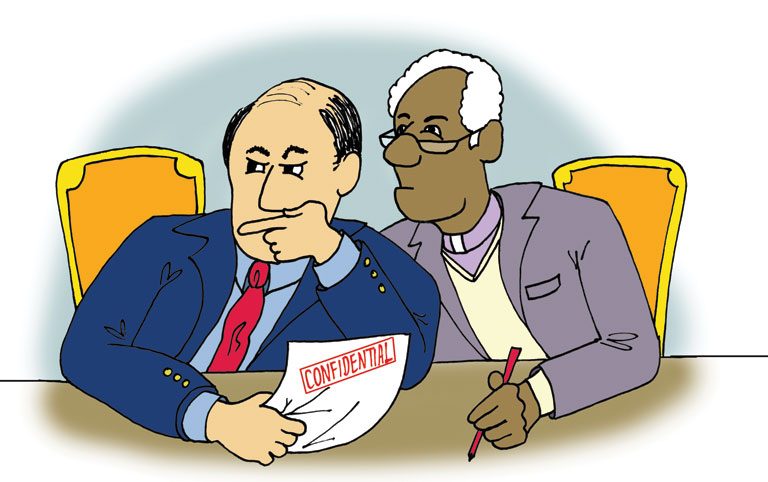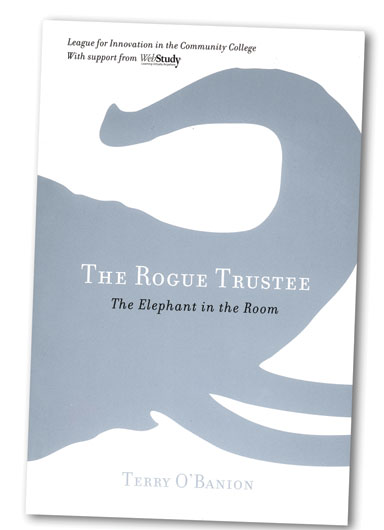 |
| Rebekah Burch Basinger serves as one of In Trust's Governance Mentors and has developed many of In Trust's board evaluation services. |
In the New Year 2009 issue of In Trust, Rebekah Burch Basinger wrote about the importance of tackling troublesome trustee behavior. Here she focuses on behavior between meetings.
Board members who behave inappropriately are uncommon and those with malicious intent are rare. However, whenever 20 or 30 fallen humans are gathered together as a governing board, one or two might slide into bad behavior between meetings. In fact, given that new-member orientation and continuing education sessions focus mostly on the work of the board when in session, it's a testimony to the good sense of the men and women who serve on theological school boards that trustees don't wander into trouble more often than they do.
But even a small number of mischief-makers within the board can cause havoc in a short time. And when bad behavior is persistent, there is the chance of lasting damage. Four types of behavior are especially harmful to the health and peaceful functioning of the board.
1. Can't stop talking, won't stop talking
It's happened again. Confidential information from the most recent meeting of the board is spreading like wildfire. Despite reminders about confidentiality, someone told someone else about what the board and the school have been up to. And that person told two friends, and - well, you know the rest of the story.
Most loose-lipped trustees mean no malice. They simply forget to hit the "pause" button when exiting the boardroom and thereby violate the "Vegas rule" of good governance - "What happens in the boardroom stays in the boardroom" (unless board members are instructed otherwise). A board education session on confidentiality or one-to-one intervention by the board chair usually takes care of the problem.
It's the intentional talkers - the board members who know they are breaching confidentiality but do it anyway - who are the real danger to the institution. The offender might be seeking to bolster his or her credibility within a constituency by mentioning confidential information. Or, perhaps upon losing a vote, a board member might be leaking information in hopes of rallying support for a lost cause. Regardless of the motive, the result is trouble. If cautions about confidentiality are ignored and breaches continue, it may be time to ask the board member to step down.
 |
Of course, board members can have legitimate concerns of conscience. Not all out-of-boardroom talk is for selfish purposes. But no matter how noble the desired end may be, going outside agreed-upon communication channels is never justified. Board members should speak up in board meetings about their concerns, and if that doesn't satisfy, they should discuss the matter privately with the president or chair. But for the broader public, there must be only one message.
Corrective: Every board should have a policy statement about confidentiality in which responsibilities are well defined and expectations are easily referenced. Then it's wise to go the extra mile by designating information as "confidential" when appropriate. Not everything uttered in the boardroom is worthy of that label, so use the "C" word judiciously.
Consider: Sometimes it's helpful to provide board members with talking points after a meeting, highlighting decisions that ought to be shared with institutional stakeholders back home. This equips trustees in their roles as ambassadors and helps clarify what's fair game for sharing. Appropriate talk about the school is part of the between-meeting work of a board.
2. Missing in action
Too much talk is one thing, but at the other end of the bad behavior spectrum are the members who simply disappear from the scene, not to be heard from again until the board's next session. They remind me of the second son described by Jesus in Matthew 21:28-32. Big talkers, they're full of promises and passion while with governance peers, but upon returning home, it's as though the school doesn't exist.
Although it's true that board members do not have individual authority except when the board is in session, board service is a 365/24/7 commitment. Trustees who understand that their responsibility is to preserve public trust in and support for the institution demonstrate that this commitment takes precedence over many other responsibilities. They are not afraid of a little night work on behalf of the school.
Corrective: A job description for board members is a crucial first step to dealing with board members who are frequently missing in action. This document should spell out what excellence in trusteeship means in this particular setting, including expectations for committee service, constituent relations, and fundraising. In an essay titled "Developing More Effective Boards," board guru Thomas Holland writes: "Conversations about shared goals, mutual promises, and steps the group will take together to attain their goals serve to build a climate of responsibility and commitment to one another." From there, board leadership needs to deal with breaches of expectations promptly and firmly to keep board performance high.
3. Reckless use of the "board card"
Theological schools roll out the red carpet when the board comes to town and do everything possible to make members feel important and appreciated. With all the attention, a few board members sometimes start to believe they have special powers, brandishing the "board card" to get their own way, to promote a pet project, or to garner a favor for a family member or friend. They mistakenly think that board service gives them extra authority.
At many theological schools, individual board members provide advice and sometimes even direct service in their areas of expertise. This requires them to exchange their governance hat for their volunteer hat - and back again - in short order. Most are adept at doing so, but some try to pull rank by taking charge when they shouldn't. When appropriate lines of communication, authority, and accountability are ignored, confusion is sure to follow.
Corrective: From new-member orientation, to policy statements, to board education sessions, clarity about the individual board member's relationship to the president and other personnel at the school is essential. The collective commitment of a board to an agreed course of action reduces the risk that any individual member (including the chair) will make a separate, individual attempt to direct the president or other campus personnel according to individual preferences.
Consider: It's not easy to fire a volunteer. How much better to do a bit of checking ahead of time - just to make certain a prospective board member's personality, work style, and interest in the mission of the school fit with what the board really needs and wants. Board Café, an online treasure-trove of good governance counsel, encourages trustee committees to check references on prospective members: "Ask the candidate for the names of the executive director and the board chair from a previous board, and call those individuals. ‘In what ways was Marguerite a positive contributor on the board? What are some things we should ask her to do?' or ‘If we were to ask Jason onto our board, what advice would you give us?'" (See www.compasspoint.org/boardcafe/details.php?id=17.)
4. Et tu, Brute?
Time hadn't dulled the pain in the voice of a speaker I once heard as he described how, early in his first presidency, he had been stabbed in the back by a friend who was also a trustee. "One week our families were vacationing together in the mountains," he said. "The next, he used what I thought were off-the-record comments and light-hearted venting to make a case against me with the executive committee of the board. Just like that, I was out of my job."
The word "betrayal" is seldom mentioned openly in board circles, but it's a sad fact of institutional life. Ironically, some of the values that theological school communities hold dear - like collegiality, transparency, and egalitarianism - can play into a mean-spirited trustee's hands. Presidents and board members need to communicate openly with each other. They should be able to ask questions, honestly speak their minds, challenge assumptions, raise issues, give and receive feedback, or simply admit confusion and request help. Vulnerability is essential to trust, and once trust has been broken, it is hard to restore.
It's not just an individual or a family that suffers at the hands of a Brutus on the board - the school is damaged as well. As the board's principal agent, the president deserves respect and loyalty. This does not imply turning a blind eye to real problems, but it does mean accepting (until proved otherwise) that the president and the administrative team are good and competent people. Reputations, both of individuals and of theological schools, take years to develop but sometimes only seconds to destroy.
Corrective: There's nothing like an up-to-date position description and a regularly scheduled evaluation to protect the president from the attack of a rogue trustee. Whether evaluation of the president is mandated in the bylaws of the school, outlined in the employment agreement with the president, or agreed to more informally, the board's commitment to providing a regular and thoughtful performance review is a key to the long-term success of a presidency. An annual review can strengthen the board-president partnership, provide a model of mutual accountability for the rest of the community to follow, and enhance the legitimacy of the presidential office.
Keeping the peace
We can talk about valuing peace within our governance structures, but only one thing truly builds it: the way people behave - in the boardroom and elsewhere. Dealing with out-of-line board members and removing them, if necessary, is a must if the board is to lead the organization effectively. Confrontation doesn't come easily, especially when working with volunteers, but for the good of the board and the school, it's essential to restrain the loose cannons and deal with guerrilla activities quickly and directly.
 |
For more helpful advice on identifying and confronting badly behaving board members, see The Rogue Trustee: The Elephant in the Room, by Terry O'Banion (League for Innovation in the Community College, 2009, 104 pp., $28). The book is based on a study of community college boards, which means there's not a direct parallel between what the author describes and the experiences of most seminary boards. But much of what O'Banion has to say can be helpful to board leaders who are dealing with a rogue within their midst - or who want to ward off such behavior down the road.
Cartoons by Geoffrey Isley.